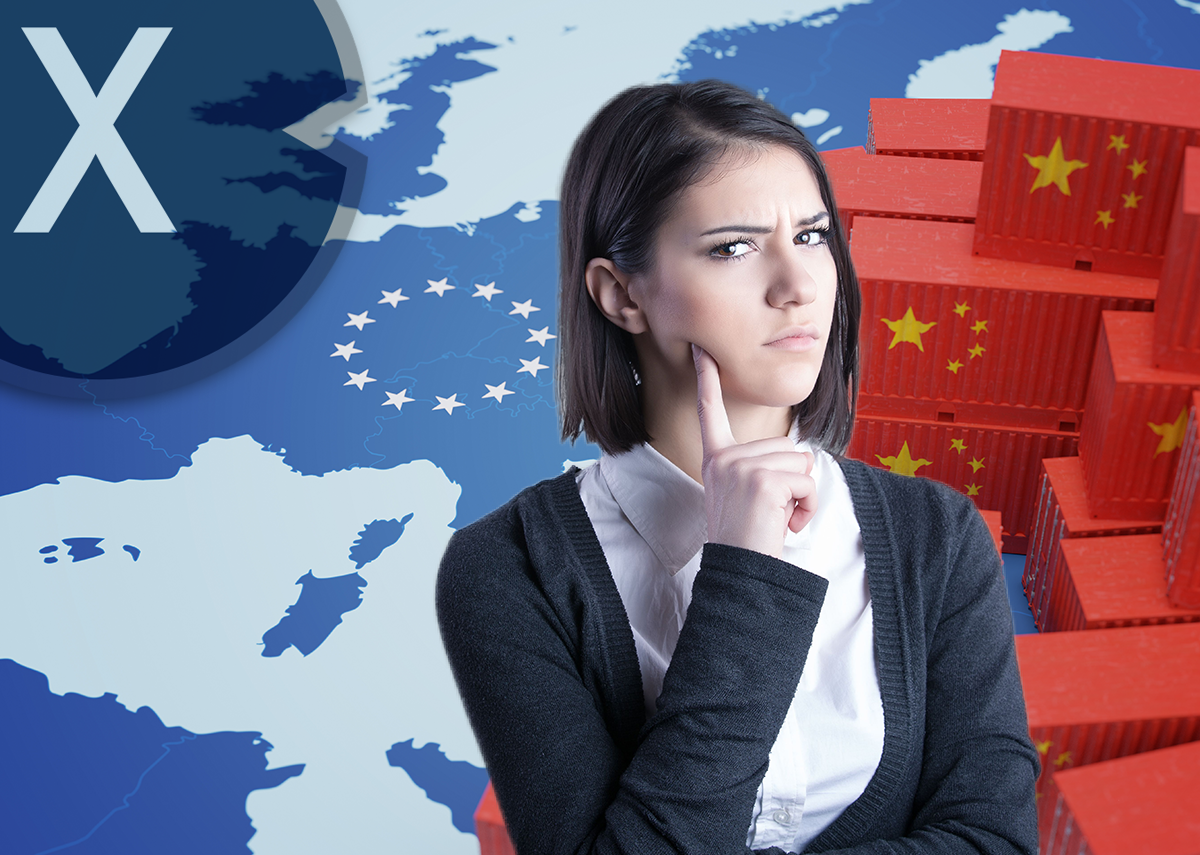
EU launches investigation and examines measures against subsidized electric cars from China – Image: Xpert.Digital
🚗🚗🚗 China's government support for electric car manufacturers 🗒️
China's strategy for electric cars
China has pursued an ambitious strategy to promote electric cars in recent years. This includes massive government support in the form of subsidies, tax incentives and other financial incentives for electric car manufacturers.
Massive government subsidies
Chinese EV manufacturers receive significant government subsidies that allow them to offer their products at a lower price. These subsidies cover various areas, including research and development, production and sales of electric vehicles.
Distortion of competition
EU Commission President Ursula von der Leyen has criticized that this state support is artificially depressing the price of Chinese electric cars and thereby distorting the market. As a result, European companies are finding it difficult to compete with the low prices offered by Chinese competitors.
The EU investigation
EU reaction
In response to this issue, the European Union (EU) plans to launch an investigation. The EU Commission is concerned about the impact of Chinese state support on the European electric vehicle market and intends to take measures to ensure a level playing field.
World markets and Chinese electric cars
The EU's concern is that global markets could be flooded with cheaper Chinese electric cars, endangering the position of European electric car manufacturers.
Causes of the investigation
The EU investigation aims to examine the precise nature of government support for Chinese electric car manufacturers to determine whether they violate fair competition rules. This could lead to measures to restore competitive conditions.
Analysis and conclusion
Competitive advantage through subsidies
China's massive government support for its electric car manufacturers has undoubtedly resulted in Chinese electric cars having a competitive advantage in the market due to lower prices. This can put European manufacturers at a disadvantage.
EU measures
The EU's planned investigation shows that it is committed to maintaining fair competition and ensuring that state support does not distort competition.
Challenges for European industry
European electric car manufacturers face the challenge of dealing with strong competition from China. They must further develop their own products and drive innovation in order to remain competitive in the global market.
📣 Similar topics
- China's state subsidies for electric cars: EU plans investigation
- Distortion of competition in the e-car market: causes and consequences
- China's electric car strategy: challenges for European manufacturers
- EU Commission against dumping prices: China's influence in the e-car sector
- E-car market in transition: How government support is changing the rules
- Chinese electric cars on the rise: EU responds with investigation
- China's e-car boom: What's behind the subsidies?
- Fair competition in focus: The EU investigation into China's electric car subsidies
- The future of electromobility: challenges for European car manufacturers
- China's electric car industry under the microscope: EU looks for answers
#️⃣ Hashtags: #Electromobility #ChineseECarManufacturers #EUInvestigation #Distortion of Competition #ElectricCarMarket
Developments in this area will continue to be important as electromobility becomes more important worldwide. The EU will closely monitor how the situation develops and what measures are needed to ensure fair competition.
🌐 The importance of anti-subsidy investigations 🔎 in the EU
Anti-subsidy investigations are an important part of the European Union's (EU) trade policy. They serve to ensure that fair competition is guaranteed in the global market and unfair trading practices are avoided. In this post, we will take a closer look at the importance of anti-subsidy investigations in the EU and explain how they help protect the interests of the EU and its domestic companies.
🌐 Background information on the anti-subsidy investigation
An anti-subsidy investigation is a procedure carried out by the EU Commission to determine whether foreign companies are receiving state subsidies for selling their products on the EU market at unfair prices. This can lead to significant distortions of competition and damage the EU's domestic industry.
The investigation may result in various measures, including the imposition of punitive tariffs on the subsidized products. This is intended to ensure that prices on the EU market are fair and that domestic companies are not disadvantaged.
🛡️ Protecting EU interests
One of the main tasks of anti-subsidy investigations is to protect the interests of the EU and its member states. If foreign companies receive unfair competitive advantages through government subsidies, they can force domestic companies out of the market and put jobs at risk. Anti-subsidy investigations are a tool to counteract this risk.
🏭 Promoting local industry
Anti-subsidy investigations help promote domestic industry in the EU. By ensuring that there is fair competition, they create an environment in which domestic businesses can thrive. This is crucial for creating jobs and strengthening the EU economy.
🌍 Reducing dependence on imports
In recent years, the EU has taken measures to reduce its dependence on imports from certain countries, particularly China. An anti-subsidy investigation can be part of this effort. If the EU finds that it is too dependent on foreign subsidies in certain sectors, it can take measures to reduce this dependence.
📅 Current developments in the EU
The importance of anti-subsidy investigations in the EU has recently increased. In March, the EU Commission presented a proposal for a law on the supply of raw materials. This law is intended to ensure that the EU does not remain dependent on imports from individual countries such as China for important raw materials. This is an example of how the EU is actively working to protect its economy and reduce its dependence on foreign subsidies.
🗓️ Anti-subsidy investigations
Anti-subsidy investigations play a crucial role in EU trade policy. They serve to protect the EU's interests, promote domestic industry and reduce dependence on imports. Given current developments in the EU, particularly with regard to raw material supplies, anti-subsidy investigations are likely to continue to play an important role.
📣 Similar topics
- Anti-subsidy investigations in the EU: protection against unfair competition
- Fair Trade: The Importance of Anti-Subsidy Investigations in the EU
- Strengthening domestic industry: How anti-subsidy investigations help the EU
- EU raw material supply: measures against dependence on China
- Current developments: Anti-subsidy investigations in the EU
- Trade policy in the EU: The role of anti-subsidy investigations
- Protection from subsidies: How the EU defends its interests
- Economic development: anti-subsidy investigations and the EU
- Raw material supply in the EU: strategies for reducing dependency
- EU trade policy in transition: anti-subsidy investigations as a key tool
#️⃣ Hashtags: #Trade Policy #Antisubsidy Investigation #EU #Competition #DomesticIndustry
🗒️ Europe's path to sustainable raw material supply ⚡
In a world characterized by digital innovation and growing environmental awareness, Europe faces the challenge of achieving its climate and digital goals. A key aspect of this journey is the sustainable supply of critical raw materials. Lithium, cobalt, nickel, gallium, raw boron, titanium and tungsten are not just cryptic chemical terms, but they form the foundation for our green future.
The importance of critical raw materials
Why are these raw materials so crucial? Well, they are the unseen heroes of our modern world. Lithium, cobalt and nickel are essential components of batteries used in electric vehicles and renewable energy storage systems. Gallium finds its place in solar panels that convert our solar energy. Raw boron is needed for the production of wind turbines, while titanium and tungsten play a central role in the space and defense industries.
The European Raw Materials Act
To ensure that Europe can provide these raw materials sustainably and continuously, the European Union has launched the “European Raw Material Act”. This law has a clear purpose: strengthening domestic supply chains and promoting win-win partnerships with non-EU countries.
The cornerstones of the law
The law on critical raw materials rests on four solid pillars:
1. Establish clear priorities
The law identifies critical and strategic raw materials that are crucial for green technologies, digitalization and the space and defense industries. It sets ambitious targets for domestic capacity along the supply chain by 2030 to reduce dependence on individual countries.
2. Building European capacity
The EU will invest in the entire value chain, from mining to processing and recycling. This requires increased on-site exploration, simplified permitting processes and easier access to financial resources.
3. Investing in research and innovation
The EU is committed to groundbreaking technologies in the area of critical raw materials. Through partnerships and a raw materials academy, specialists are trained to develop the required skills.
4. Promoting a sustainable and circular raw materials economy
Recycling and a strong secondary market are very important. The focus is on measures to recover raw materials from waste and to protect employee rights, human rights and the environment.
International dimension
The EU is heavily dependent on imports of critical raw materials, which, combined with increasing global demand, creates vulnerable supply chains. Therefore, the EU relies on international cooperation and trade to increase global production and diversify its supply.
The EU's Global Gateway Strategy aims at partnerships with emerging and developing countries in order to jointly benefit from the availability of critical raw materials. The EU plans to set up a critical raw materials club to expand global supply chains and regulate trading practices.
Europe
Europe is on the way to a sustainable supply of critical raw materials. The European Raw Materials Act lays the foundation for a safer and greener future. Through clear priorities, the expansion of domestic capacities, research and international partnerships, the EU will reduce its dependence and promote a sustainable raw materials economy.
- Plan photovoltaics for warehouses, commercial halls and industrial halls
- Industrial plant: Plan a photovoltaic open-air system or open-space system
- Plan solar systems with photovoltaic solutions for freight forwarding and contract logistics
- B2B solar systems and photovoltaic solutions & advice
We are there for you - advice - planning - implementation - project management
From simple solar carports to large systems: with Xpert.Solar your individual solar carport advice
I would be happy to serve as your personal advisor.
You can contact me by filling out the contact form below or simply call me on +49 89 89 674 804 (Munich) .
I'm looking forward to our joint project.
Xpert.Digital - Konrad Wolfenstein
Xpert.Digital is a hub for industry with a focus on digitalization, mechanical engineering, logistics/intralogistics and photovoltaics.
With our 360° business development solution, we support well-known companies from new business to after sales.
Market intelligence, smarketing, marketing automation, content development, PR, mail campaigns, personalized social media and lead nurturing are part of our digital tools.
You can find out more at: www.xpert.digital - www.xpert.solar - www.xpert.plus

